Resume
Clinical Nurse Cover Letter Examples

May 29, 2025
|
12 min read
Your complete guide to writing a clinical nurse cover letter that helps you 'care-fully' navigate through qualifications and standout skills, ensuring your application is as effective as your bedside manner.
4.70 Average rating
Rated by 348 people
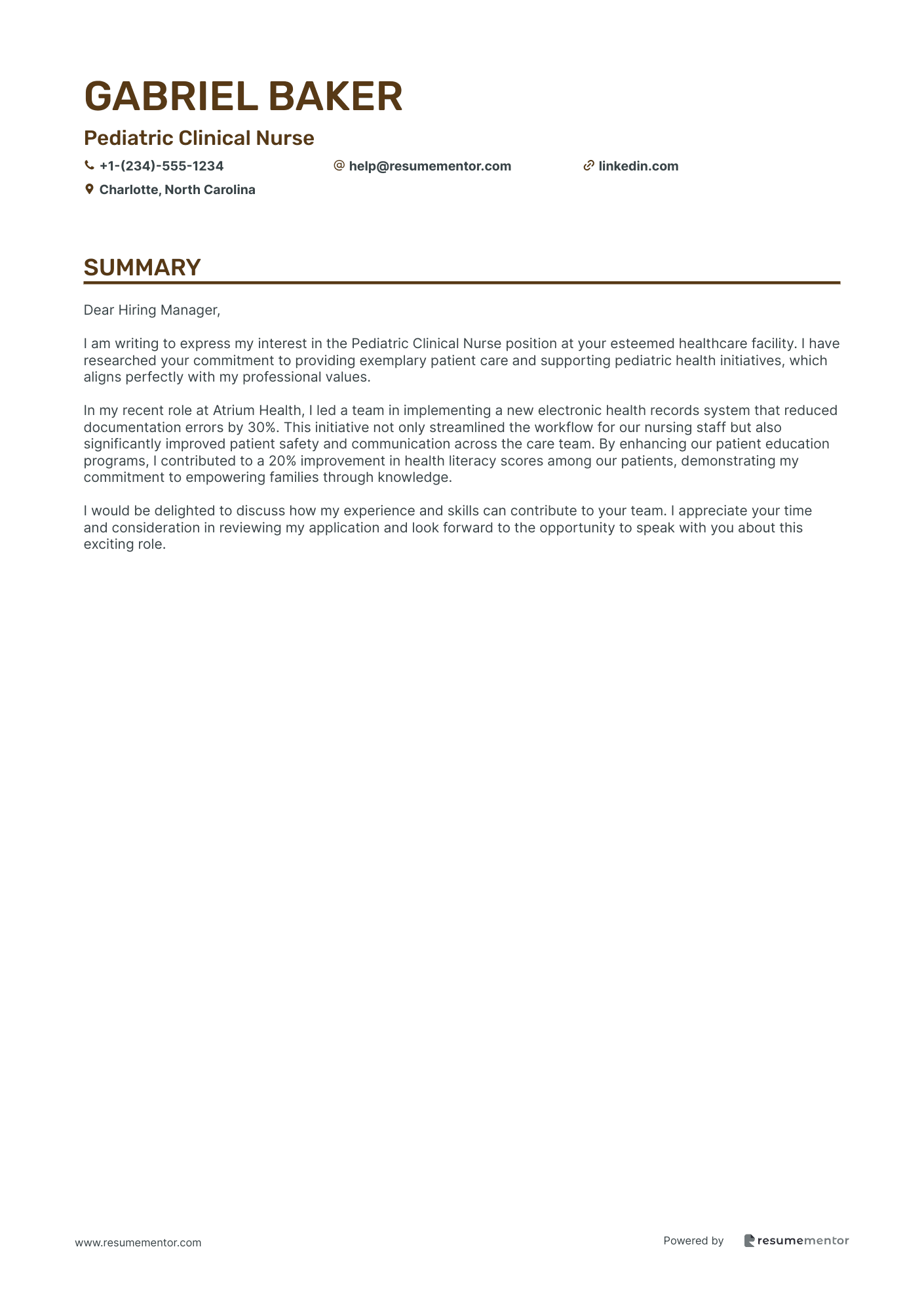
Pediatric Clinical Nurse
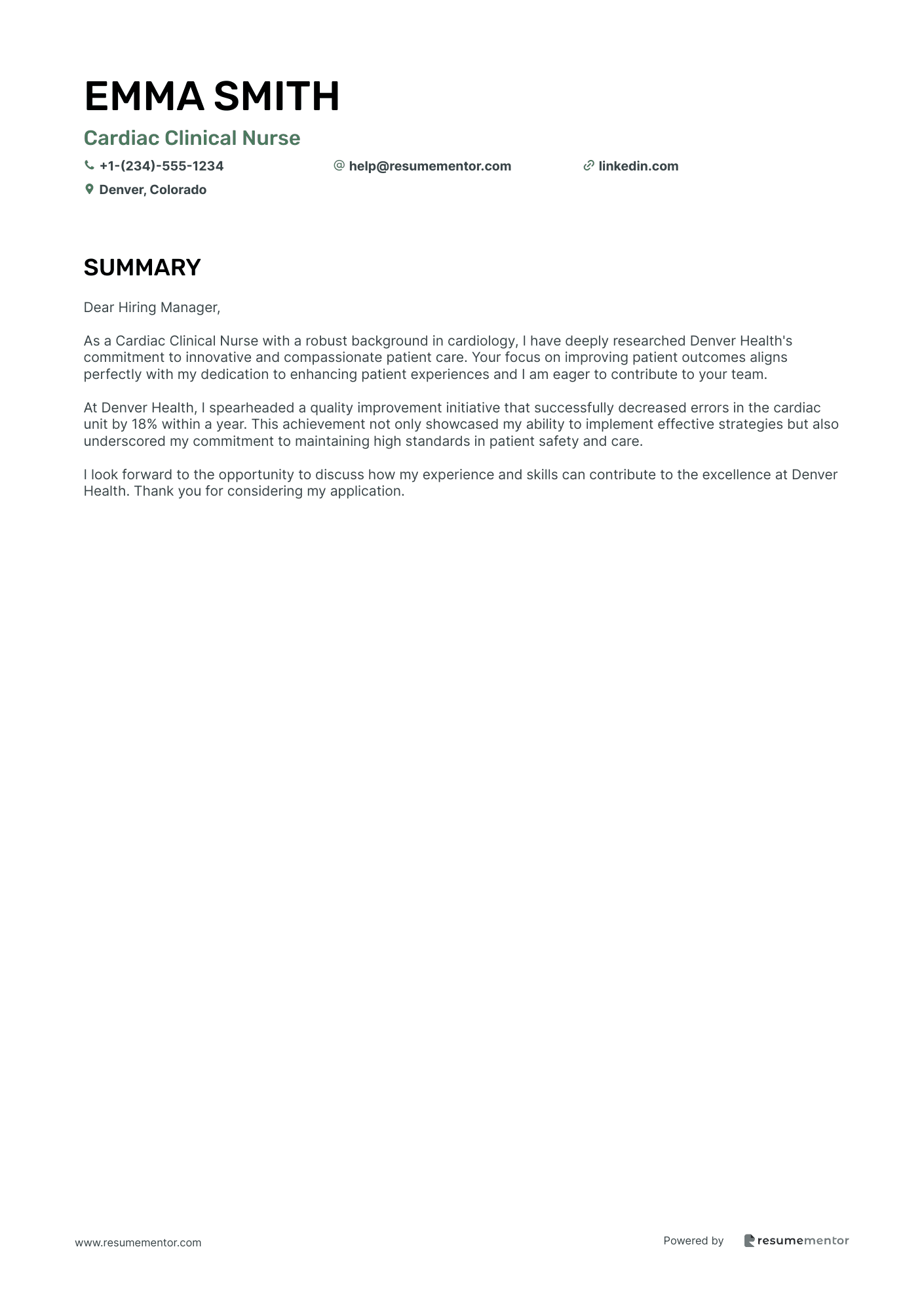
Cardiac Clinical Nurse
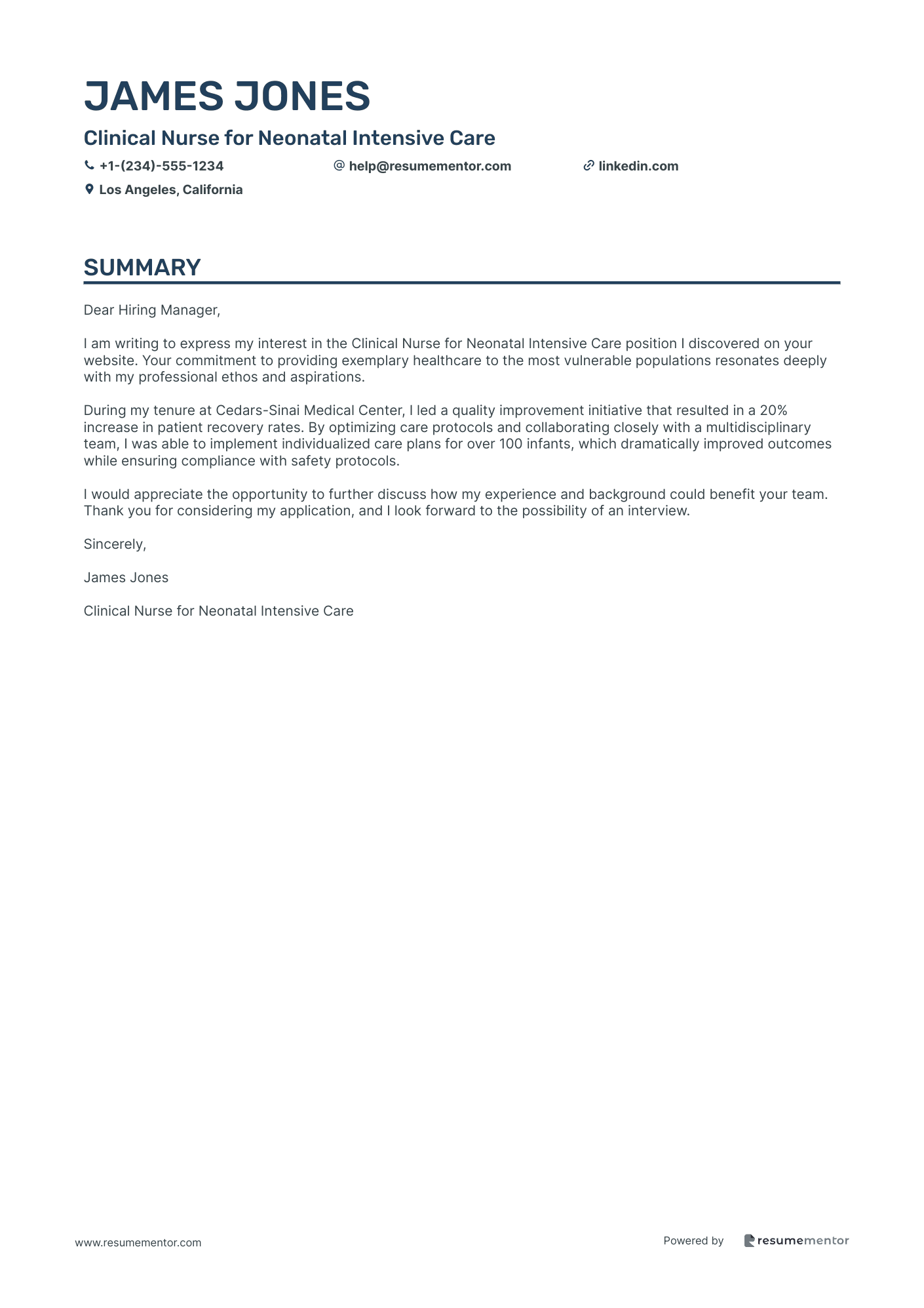
Clinical Nurse for Neonatal Intensive Care
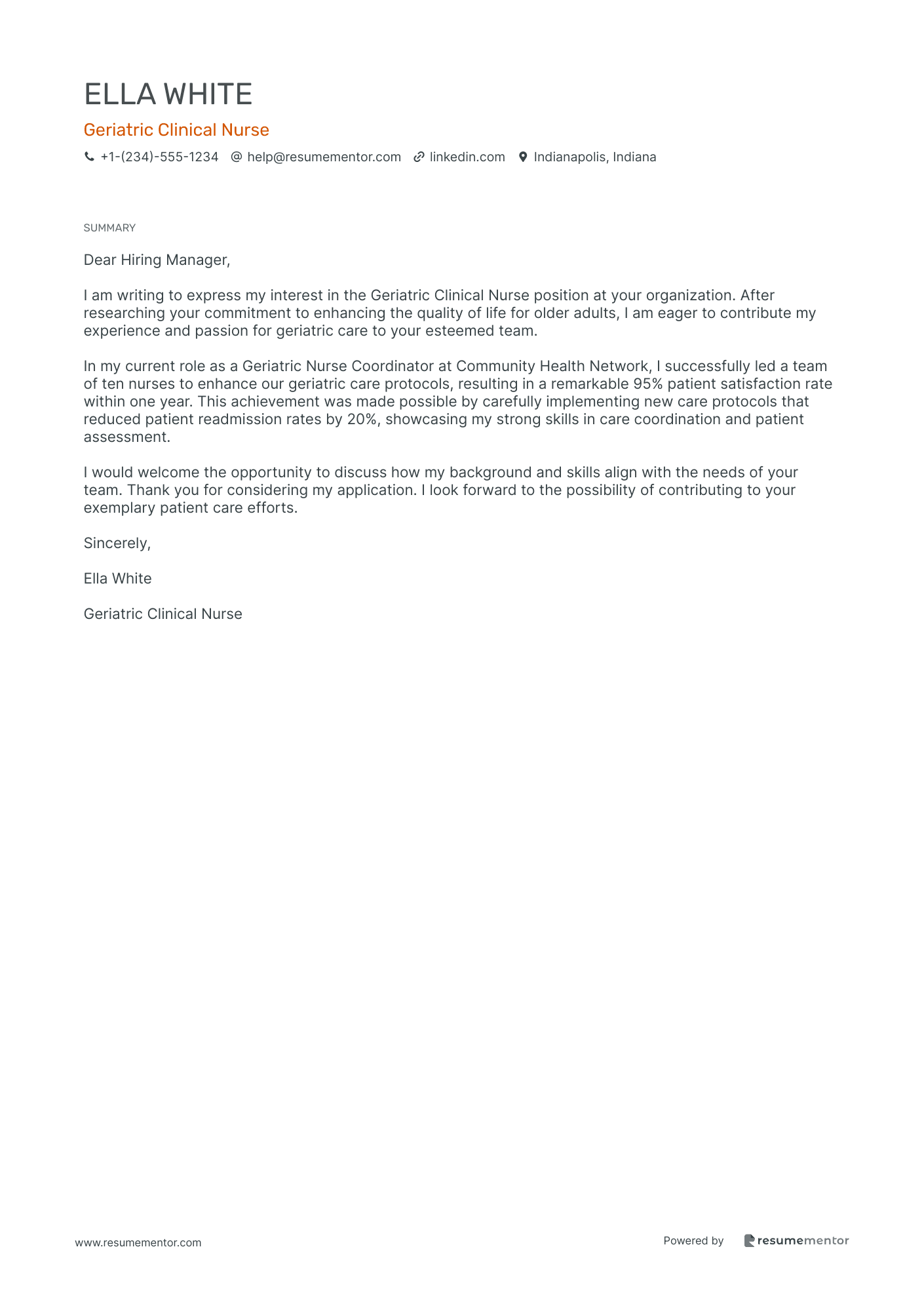
Geriatric Clinical Nurse
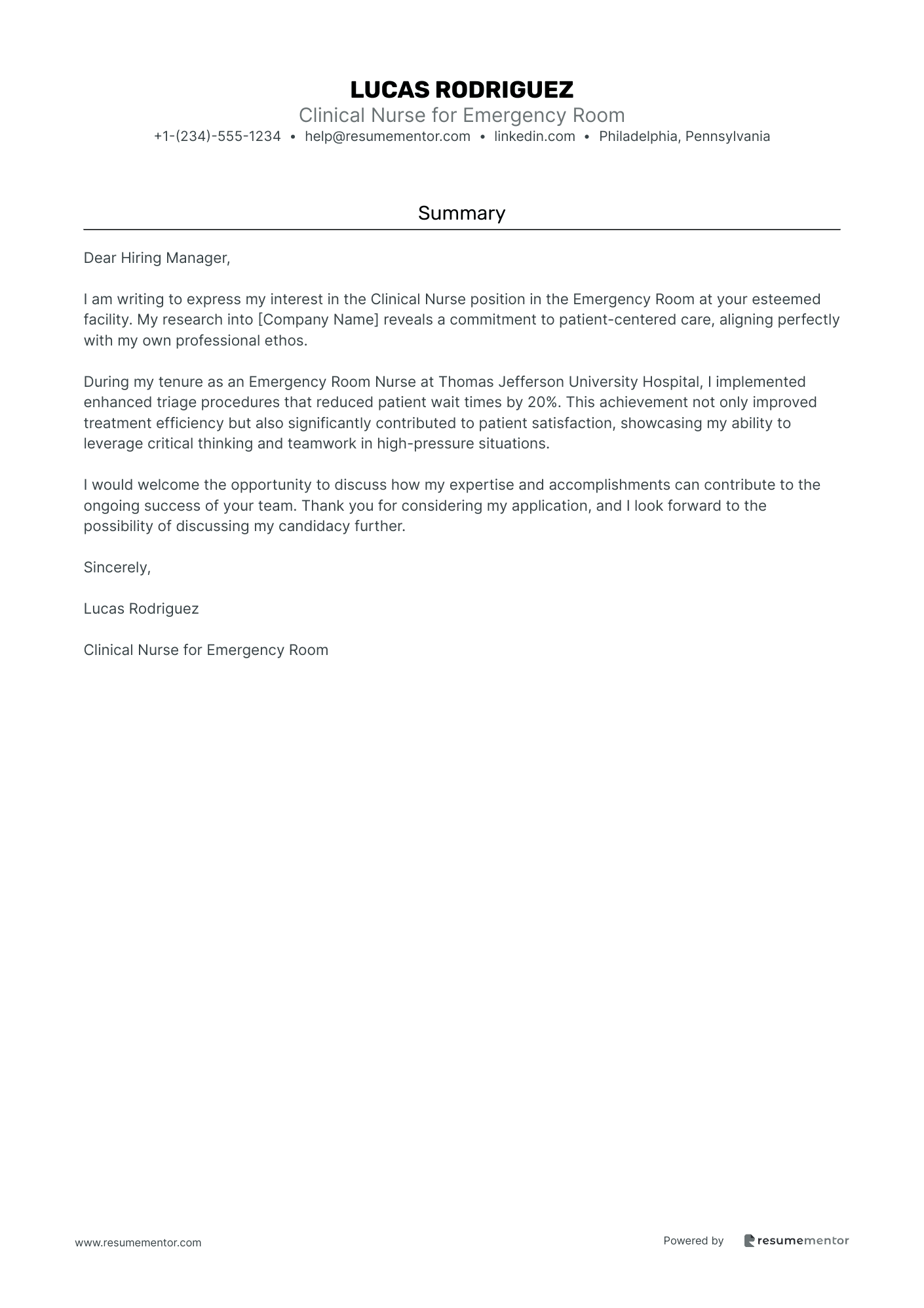
Clinical Nurse for Emergency Room
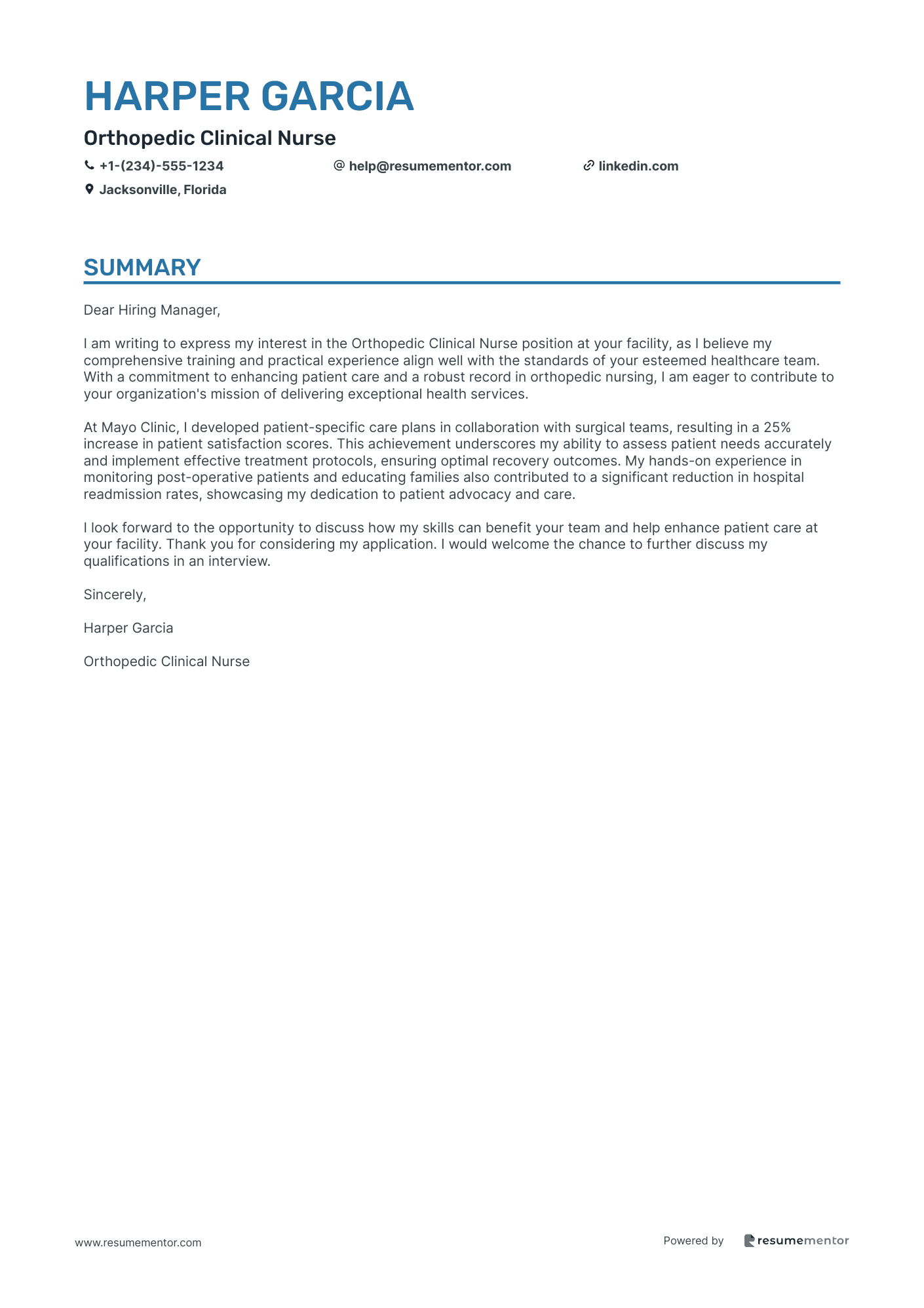
Orthopedic Clinical Nurse
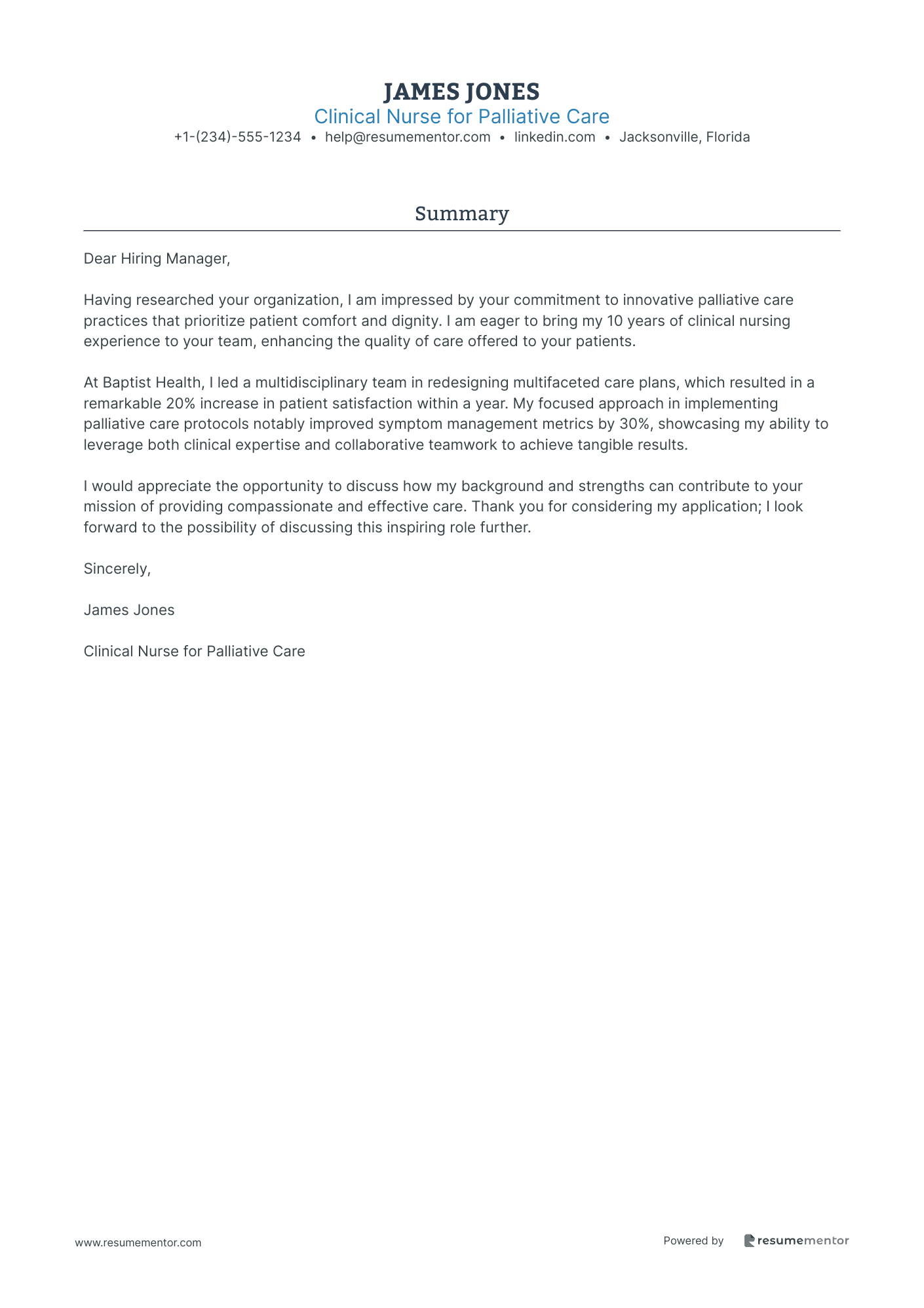
Clinical Nurse for Palliative Care
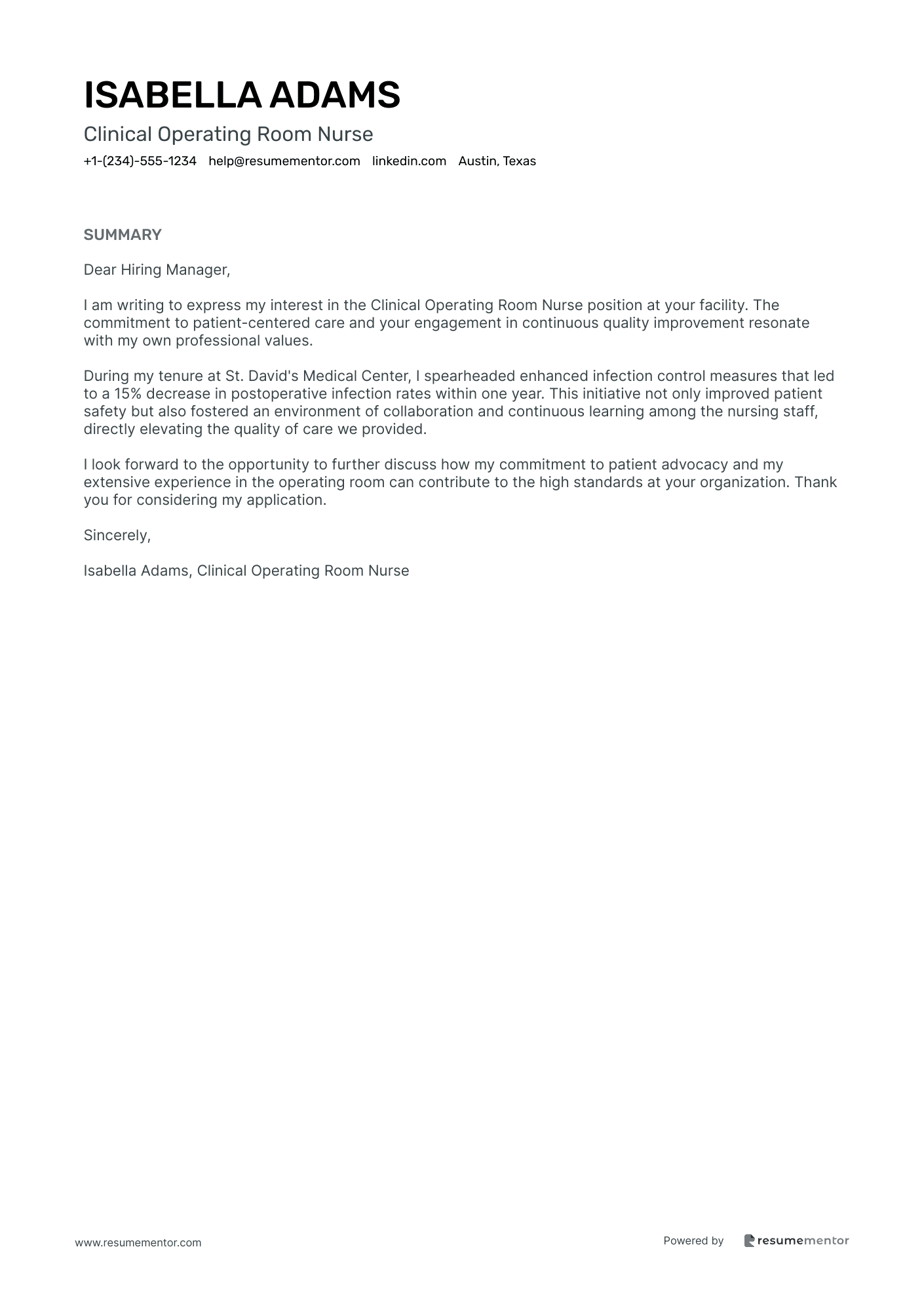
Clinical Operating Room Nurse
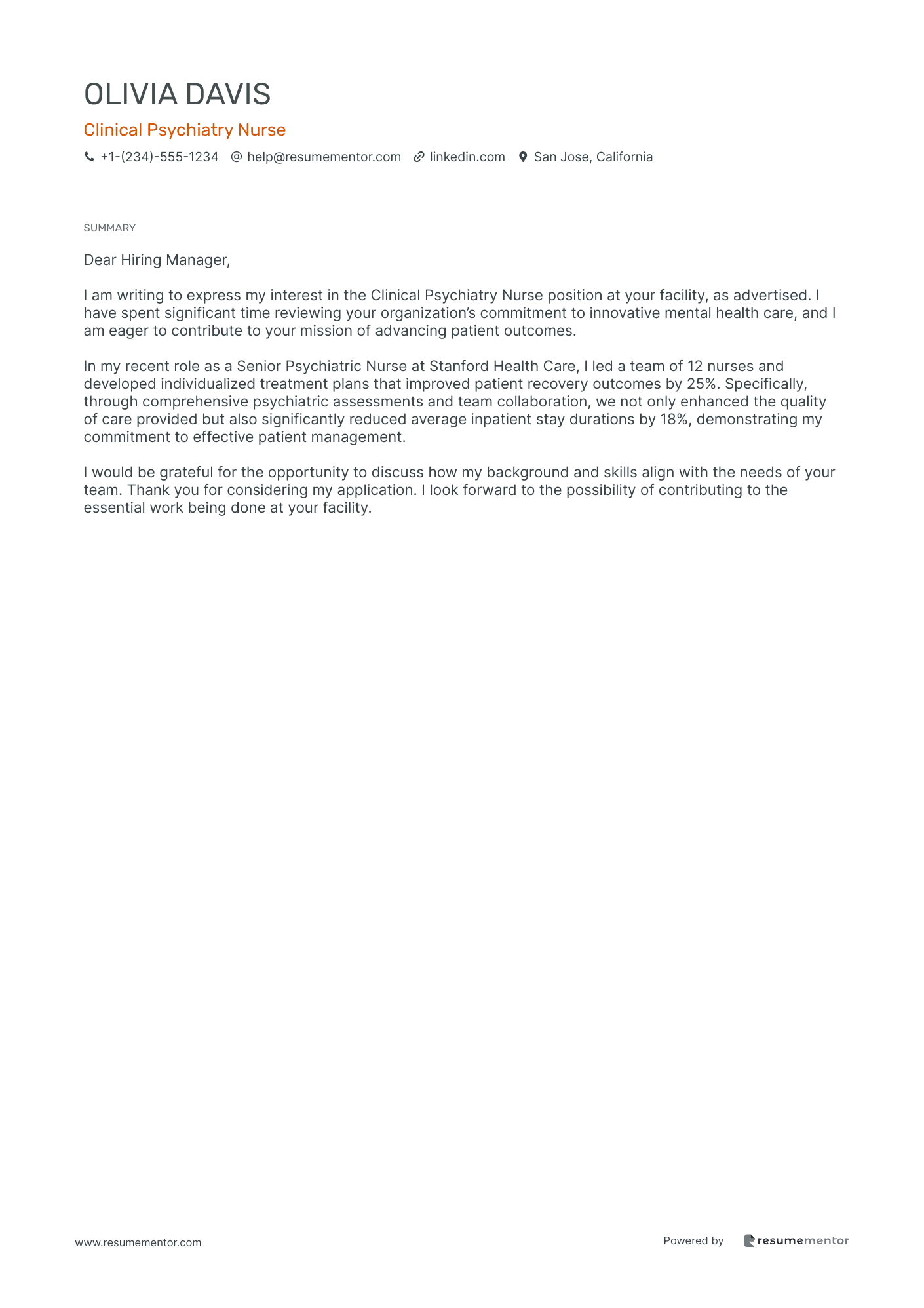
Clinical Psychiatry Nurse
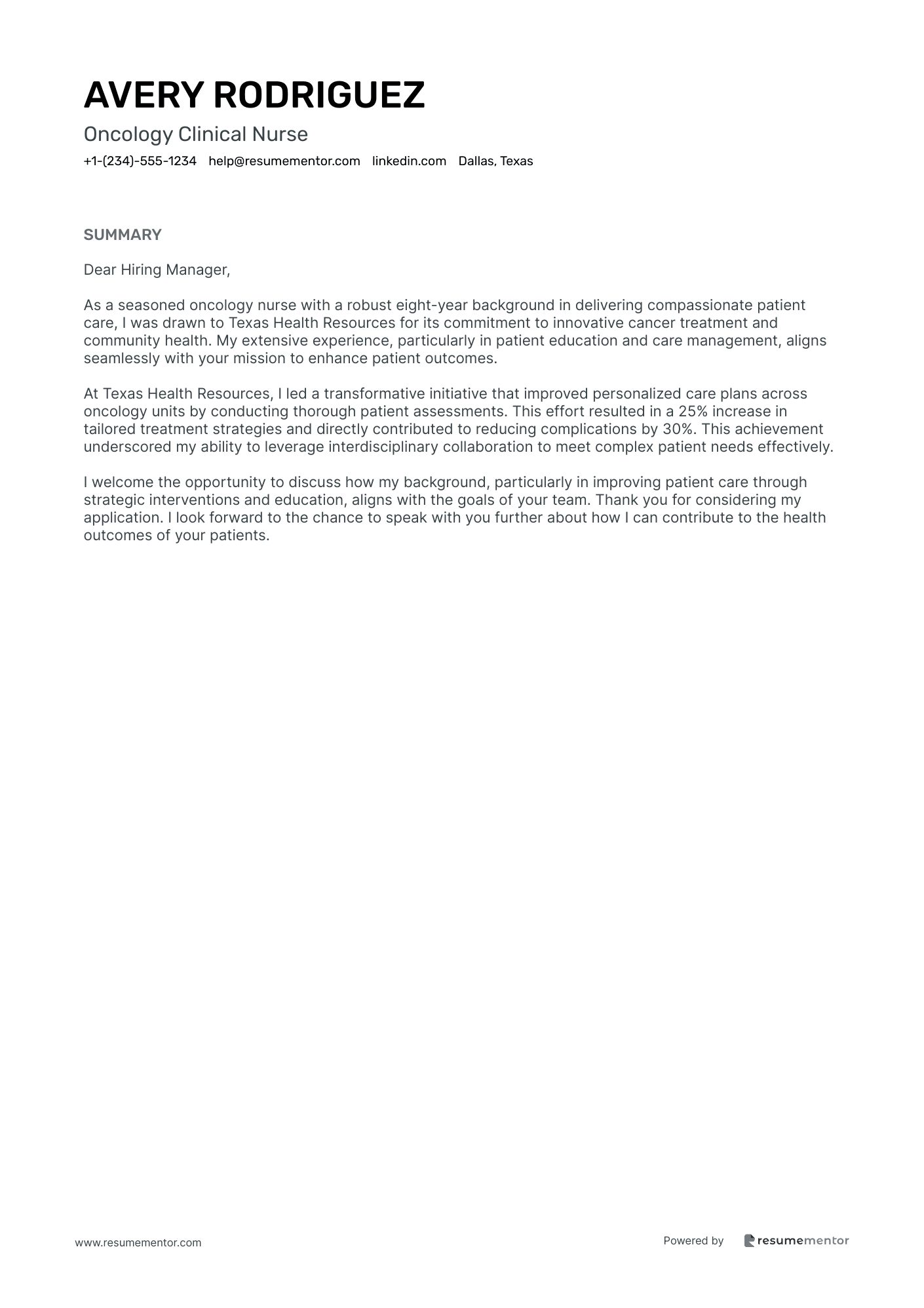
Oncology Clinical Nurse

Pediatric Clinical Nurse cover letter sample
When applying for this position, it’s essential to highlight your clinical experiences with pediatric patients. Detail any certifications you hold, such as Pediatric Advanced Life Support (PALS) or Certified Pediatric Nurse (CPN). Focus on your ability to communicate with children and their families, showcasing your empathy and patience. Provide specific examples of how your interventions led to positive patient outcomes. Additionally, discuss your teamwork and collaboration skills, demonstrating how you’ve worked with multidisciplinary teams to enhance care and improve patient satisfaction.
Gabriel Baker
Pediatric Clinical Nurse
Summary
Dear Hiring Manager,
I am writing to express my interest in the Pediatric Clinical Nurse position at your esteemed healthcare facility. I have researched your commitment to providing exemplary patient care and supporting pediatric health initiatives, which aligns perfectly with my professional values.
In my recent role at Atrium Health, I led a team in implementing a new electronic health records system that reduced documentation errors by 30%. This initiative not only streamlined the workflow for our nursing staff but also significantly improved patient safety and communication across the care team. By enhancing our patient education programs, I contributed to a 20% improvement in health literacy scores among our patients, demonstrating my commitment to empowering families through knowledge.
I would be delighted to discuss how my experience and skills can contribute to your team. I appreciate your time and consideration in reviewing my application and look forward to the opportunity to speak with you about this exciting role.
Cardiac Clinical Nurse cover letter sample
When writing your cover letter, it's essential to highlight your clinical experience in cardiology or critical care settings. Mention any specialized training, such as advanced cardiac life support (ACLS) or cardiac rehabilitation programs, to demonstrate your expertise. Showcase how your ability to assess patient conditions led to improved outcomes. Provide examples of your teamwork in multidisciplinary settings, emphasizing communication with physicians and family members. Additionally, detail any initiatives you've led that improved patient care or streamlined processes, illustrating your commitment to enhancing healthcare delivery.
Summary
Dear Hiring Manager,
As a Cardiac Clinical Nurse with a robust background in cardiology, I have deeply researched Denver Health's commitment to innovative and compassionate patient care. Your focus on improving patient outcomes aligns perfectly with my dedication to enhancing patient experiences and I am eager to contribute to your team.
At Denver Health, I spearheaded a quality improvement initiative that successfully decreased errors in the cardiac unit by 18% within a year. This achievement not only showcased my ability to implement effective strategies but also underscored my commitment to maintaining high standards in patient safety and care.
I look forward to the opportunity to discuss how my experience and skills can contribute to the excellence at Denver Health. Thank you for considering my application.
Clinical Nurse for Neonatal Intensive Care cover letter sample
When crafting your cover letter, prioritize your clinical experience in a critical care setting. Highlight any specialized training in neonatal care, as well as certifications such as NRP (Neonatal Resuscitation Program) or STABLE. Mention your ability to assess and monitor vital signs, ensuring the safety and health of newborns. Provide concrete examples of situations where your interventions improved patient outcomes. Use the 'skill-action-result' method to illustrate your contributions in teamwork and communication in high-pressure environments, demonstrating your readiness for the challenges ahead.
James Jones
Clinical Nurse for Neonatal Intensive Care
Summary
Dear Hiring Manager,
I am writing to express my interest in the Clinical Nurse for Neonatal Intensive Care position I discovered on your website. Your commitment to providing exemplary healthcare to the most vulnerable populations resonates deeply with my professional ethos and aspirations.
During my tenure at Cedars-Sinai Medical Center, I led a quality improvement initiative that resulted in a 20% increase in patient recovery rates. By optimizing care protocols and collaborating closely with a multidisciplinary team, I was able to implement individualized care plans for over 100 infants, which dramatically improved outcomes while ensuring compliance with safety protocols.
I would appreciate the opportunity to further discuss how my experience and background could benefit your team. Thank you for considering my application, and I look forward to the possibility of an interview.
Sincerely,
James Jones
Clinical Nurse for Neonatal Intensive Care
Geriatric Clinical Nurse cover letter sample
In your cover letter, emphasize any experience in geriatrics or working with older adults. Highlight your skills in patient assessment and care planning. Mention certifications like Basic Life Support (BLS) or Geriatric Nursing Certification. Discuss your ability to communicate effectively with patients and their families. Provide examples of how you've improved patient outcomes or comfort levels in past roles. Use specific situations to show your problem-solving skills and compassion. This will illustrate your qualifications and dedication, setting you apart from other candidates.
Ella White
Geriatric Clinical Nurse
Summary
Dear Hiring Manager,
I am writing to express my interest in the Geriatric Clinical Nurse position at your organization. After researching your commitment to enhancing the quality of life for older adults, I am eager to contribute my experience and passion for geriatric care to your esteemed team.
In my current role as a Geriatric Nurse Coordinator at Community Health Network, I successfully led a team of ten nurses to enhance our geriatric care protocols, resulting in a remarkable 95% patient satisfaction rate within one year. This achievement was made possible by carefully implementing new care protocols that reduced patient readmission rates by 20%, showcasing my strong skills in care coordination and patient assessment.
I would welcome the opportunity to discuss how my background and skills align with the needs of your team. Thank you for considering my application. I look forward to the possibility of contributing to your exemplary patient care efforts.
Sincerely,
Ella White
Geriatric Clinical Nurse
Clinical Nurse for Emergency Room cover letter sample
When applying for a position in the health sector, it's important to underscore your clinical experience in high-pressure settings. Highlight your ability to perform under stress, showcasing any certifications like Advanced Cardiac Life Support (ACLS) or Pediatric Advanced Life Support (PALS). Mention teamwork and collaboration with physicians and other healthcare personnel as essential skills. Provide specific examples demonstrating how your quick decision-making and resourcefulness improved patient outcomes. Use the 'skill-action-result' format to convey how your expertise leads to efficient care in urgent situations.
Lucas Rodriguez
Clinical Nurse for Emergency Room
Summary
Dear Hiring Manager,
I am writing to express my interest in the Clinical Nurse position in the Emergency Room at your esteemed facility. My research into [Company Name] reveals a commitment to patient-centered care, aligning perfectly with my own professional ethos.
During my tenure as an Emergency Room Nurse at Thomas Jefferson University Hospital, I implemented enhanced triage procedures that reduced patient wait times by 20%. This achievement not only improved treatment efficiency but also significantly contributed to patient satisfaction, showcasing my ability to leverage critical thinking and teamwork in high-pressure situations.
I would welcome the opportunity to discuss how my expertise and accomplishments can contribute to the ongoing success of your team. Thank you for considering my application, and I look forward to the possibility of discussing my candidacy further.
Sincerely,
Lucas Rodriguez
Clinical Nurse for Emergency Room
Orthopedic Clinical Nurse cover letter sample
When preparing your application, focus on your clinical experience in orthopedic settings. Highlight your familiarity with orthopedic procedures and patient management. Strong assessment and critical thinking skills are crucial for this role. If you've completed relevant training or certifications, like trauma care or pain management, emphasize these to showcase your knowledge. Include specific examples of how you've improved patient outcomes or enhanced recovery times. Use the 'skill-action-result' method to clearly convey your impact on patient care and team collaboration in previous positions.
Harper Garcia
Orthopedic Clinical Nurse
Summary
Dear Hiring Manager,
I am writing to express my interest in the Orthopedic Clinical Nurse position at your facility, as I believe my comprehensive training and practical experience align well with the standards of your esteemed healthcare team. With a commitment to enhancing patient care and a robust record in orthopedic nursing, I am eager to contribute to your organization's mission of delivering exceptional health services.
At Mayo Clinic, I developed patient-specific care plans in collaboration with surgical teams, resulting in a 25% increase in patient satisfaction scores. This achievement underscores my ability to assess patient needs accurately and implement effective treatment protocols, ensuring optimal recovery outcomes. My hands-on experience in monitoring post-operative patients and educating families also contributed to a significant reduction in hospital readmission rates, showcasing my dedication to patient advocacy and care.
I look forward to the opportunity to discuss how my skills can benefit your team and help enhance patient care at your facility. Thank you for considering my application. I would welcome the chance to further discuss my qualifications in an interview.
Sincerely,
Harper Garcia
Orthopedic Clinical Nurse
Clinical Nurse for Palliative Care cover letter sample
Highlight your experience in providing compassionate care. Emphasize any specialized training or certifications in pain management or symptom relief. Focus on your ability to communicate effectively with patients and families, ensuring they feel supported in challenging times. Showcase examples of how you advocated for patient needs or improved care plans, following the 'skill-action-result' format. Mention any teamwork with interdisciplinary teams to enhance patient outcomes. Include instances where your skills led to positive feedback from patients or family members, demonstrating your commitment to quality care.
James Jones
Clinical Nurse for Palliative Care
Summary
Dear Hiring Manager,
Having researched your organization, I am impressed by your commitment to innovative palliative care practices that prioritize patient comfort and dignity. I am eager to bring my 10 years of clinical nursing experience to your team, enhancing the quality of care offered to your patients.
At Baptist Health, I led a multidisciplinary team in redesigning multifaceted care plans, which resulted in a remarkable 20% increase in patient satisfaction within a year. My focused approach in implementing palliative care protocols notably improved symptom management metrics by 30%, showcasing my ability to leverage both clinical expertise and collaborative teamwork to achieve tangible results.
I would appreciate the opportunity to discuss how my background and strengths can contribute to your mission of providing compassionate and effective care. Thank you for considering my application; I look forward to the possibility of discussing this inspiring role further.
Sincerely,
James Jones
Clinical Nurse for Palliative Care
Clinical Operating Room Nurse cover letter sample
When applying for this position, highlight any clinical experience, especially in surgical settings. Emphasize your ability to work in fast-paced environments and manage multiple tasks efficiently. Include relevant certifications, such as Basic Life Support (BLS) or Advanced Cardiovascular Life Support (ACLS), to demonstrate your training. Share specific instances where your attention to detail improved patient outcomes or streamlined processes. Use the 'skill-action-result' format to showcase how your contributions made a positive impact on team dynamics and patient care.
Isabella Adams
Clinical Operating Room Nurse
Summary
Dear Hiring Manager,
I am writing to express my interest in the Clinical Operating Room Nurse position at your facility. The commitment to patient-centered care and your engagement in continuous quality improvement resonate with my own professional values.
During my tenure at St. David's Medical Center, I spearheaded enhanced infection control measures that led to a 15% decrease in postoperative infection rates within one year. This initiative not only improved patient safety but also fostered an environment of collaboration and continuous learning among the nursing staff, directly elevating the quality of care we provided.
I look forward to the opportunity to further discuss how my commitment to patient advocacy and my extensive experience in the operating room can contribute to the high standards at your organization. Thank you for considering my application.
Sincerely,
Isabella Adams, Clinical Operating Room Nurse
Clinical Psychiatry Nurse cover letter sample
When applying for this role, it's essential to emphasize your clinical experience in mental health settings. Highlight your knowledge of psychiatric disorders and any relevant certifications, such as 'Crisis Prevention' or 'Mental Health First Aid'. Stress your ability to provide empathetic care and conduct thorough assessments. Include examples of how your interventions have improved patient outcomes or reduced crisis situations. Using a 'situation-task-action-result' format can effectively demonstrate your impact on patient safety and wellbeing in previous positions.
Olivia Davis
Clinical Psychiatry Nurse
Summary
Dear Hiring Manager,
I am writing to express my interest in the Clinical Psychiatry Nurse position at your facility, as advertised. I have spent significant time reviewing your organization’s commitment to innovative mental health care, and I am eager to contribute to your mission of advancing patient outcomes.
In my recent role as a Senior Psychiatric Nurse at Stanford Health Care, I led a team of 12 nurses and developed individualized treatment plans that improved patient recovery outcomes by 25%. Specifically, through comprehensive psychiatric assessments and team collaboration, we not only enhanced the quality of care provided but also significantly reduced average inpatient stay durations by 18%, demonstrating my commitment to effective patient management.
I would be grateful for the opportunity to discuss how my background and skills align with the needs of your team. Thank you for considering my application. I look forward to the possibility of contributing to the essential work being done at your facility.
Oncology Clinical Nurse cover letter sample
When writing your cover letter, emphasize your clinical experience in oncology or related fields. Highlight your ability to administer chemotherapy and manage side effects, as these skills are essential in patient care. Certifications in oncology nursing or relevant continuing education courses should be included to demonstrate your commitment. Use examples to illustrate your compassionate care approach and ability to educate patients about their treatment plans. Showcase any teamwork or leadership roles that demonstrate your collaboration skills in a clinical setting for a more focused impact.
Avery Rodriguez
Oncology Clinical Nurse
Summary
Dear Hiring Manager,
As a seasoned oncology nurse with a robust eight-year background in delivering compassionate patient care, I was drawn to Texas Health Resources for its commitment to innovative cancer treatment and community health. My extensive experience, particularly in patient education and care management, aligns seamlessly with your mission to enhance patient outcomes.
At Texas Health Resources, I led a transformative initiative that improved personalized care plans across oncology units by conducting thorough patient assessments. This effort resulted in a 25% increase in tailored treatment strategies and directly contributed to reducing complications by 30%. This achievement underscored my ability to leverage interdisciplinary collaboration to meet complex patient needs effectively.
I welcome the opportunity to discuss how my background, particularly in improving patient care through strategic interventions and education, aligns with the goals of your team. Thank you for considering my application. I look forward to the chance to speak with you further about how I can contribute to the health outcomes of your patients.
Related Articles

Continue Reading
Check more recommended readings to get the job of your dreams.
Resume
Resources
Tools
© 2026. All rights reserved.
Made with love by people who care.
